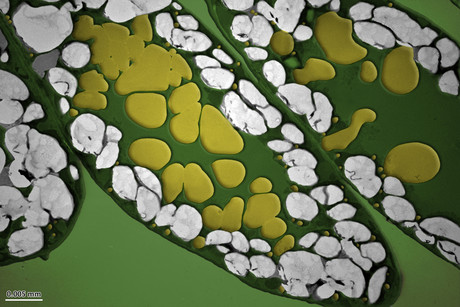Producing oil in plant leaves

Researchers at CSIRO have made it possible to produce oil in the leaves, stems and seeds of plants, in a breakthrough which could mark a milestone for the renewable oils industry.
“Previously it has only been possible to extract oil from the oil-rich seeds and fruits of some specialised plants, such as canola, soybean, sunflower, coconut and oil palm,” said Dr Allan Green, innovation leader with CSIRO Agriculture and Food.
“What we have been able to do is switch on this high-level oil production in vegetative tissue, such as in stems and leaves, as well.”
Dr Green explained that the researchers are using solar energy captured by plants to convert their leaves’ starch reserves into more energy-dense oil molecules, which increases the energy value of the vegetative tissue where the oil accumulates. In some plants the research team has been able to get around 35% oil content into vegetative tissue — the same amount as in many oilseed crops.
“If the technology were applied to existing oil crops it could potentially treble oil productivity and greatly expand renewable oil production worldwide,” Dr Green said.
CSIRO recently signed an agreement with US-based company Amfora, which will see the start-up advance development and commercialisation of the technology to produce energy-rich feed for livestock. Amfora will use the technology to develop oil content in the vegetative tissue of corn and sorghum, meaning they can market a feed for dairy farmers that does not require them to purchase additional oils to supplement feeds.
The agreement with Amfora provides a direct path to market, as the oil does not need to be extracted from the leaves before it is fed to cattle. Future applications, such as the production of industrial oils and bio-based diesel, will require further industrial supply chain development to customise techniques for extracting the oil and converting it to suitable products.
Why are young plants more vulnerable to disease?
Fighting disease at a young age often comes at a steep cost to plants' growth and future...
Liquid catalyst could transform chemical manufacturing
A major breakthrough in liquid catalysis is transforming how essential products are made, making...
How light helps plants survive in harsh environments
Researchers from National Taiwan University have uncovered how light stabilises a key...




